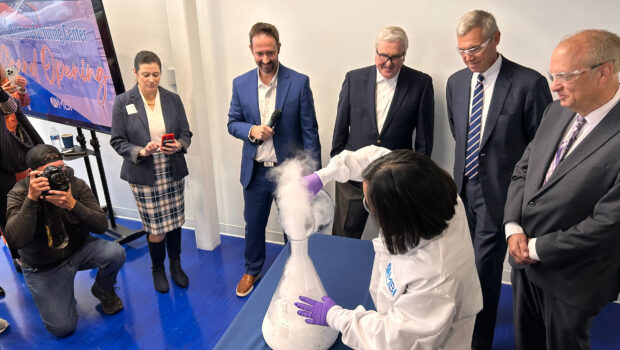From the Chamber Exchange Newspaper November 2023
Can you explain in a nutshell the mission of Massachusetts Biomedical Initiatives and why you needed to expand your headquarters at 17 Briden Street with your new Pilot Biomanufacturing Center?
MBI’s mission is to be a partner for fostering innovation in the life sciences. We achieve this by incubating early-stage biotech companies from concept to clinical trials, growing the life sciences workforce, and expanding the biocluster in Central Massachusetts with a particular focus on growing biomanufacturing. In 2020, we believed in the strength of the biocluster and more than doubled the size of our incubator with our StartUp & ScaleUp projects at our 17 Briden Street location. This included the creation of 28 new lab spaces which were fully occupied within 10 months and have already served over 30 companies that have raised over $280 million and created more than 130 jobs. The expansion allowed us to extend how long we supported early-stage startups because it allowed us to create space that grows incrementally in the same way companies do. Our StartUp Centers are smaller lab spaces where companies are born. Our ScaleUp Center is a slightly larger space where companies can grow. With our focus on positioning Worcester as a global hub for biomanufacturing, we decided to extend the life cycle of early-stage companies with our Pilot Scale Biomanufacturing Center. This space allows companies to begin the transition to manufacturing and clinical trials and completes our goal of supporting companies from “Concept to Clinical Trials”.
What are the most important factors in whether a life sciences startup decides to stay in the Worcester area after graduating MBI?
A key factor to our success has been the incredible talent pool in Central Massachusetts. Worcester County was recently ranked as a top 15 life sciences talent cluster independent of Boston/ Cambridge (who ranked #1). Talent is the jet fuel that the bio industry runs on and with this concentration of talent, a vibrant urban environment, proximity to partners in Boston/ Cambridge, and strong local academic partners, Worcester has a clear value proposition for the industry. These factors have enabled us to support over 30 companies at our new facility that employ over 130 local residents and have raised over $280M in private financing. The only missing ingredient is space for these companies to graduate and stay here. Based on our collective efforts, 100% of the available biotech space in the City is currently full and we desperately need more space for the industry to continue to expand.
What key strengths does Worcester and Central Massachusetts have when it comes to recruiting new life sciences companies like WuXi Biologics, and retaining existing companies like AbbVie?
Talent is key. As the R&D companies from Worcester to Cambridge enter clinical trials, they need to start producing their products in larger quantities on their pathway to patients. These manufacturing companies and contract manufacturers need access to talent, but at a lower price point than what they get in Boston/Cambridge while still maintaining proximity to their R&D operations in Boston.
The CBRE study that named Worcester a top 15 life sciences talent cluster also indicated that Worcester had “some of the strongest concentrations of life sciences researchers in the US” so we are perfectly positioned to complement the R&D side of the industry by attracting the biomanufacturing industry. Biomanufacturing is the economy of the next century and we’re focused on making the region globally competitive.
Worcester also has available, pad-ready sites like the Reactory and a group of dedicated economic development and academic partners focused on supporting their success. Worcester, and all of Central Massachusetts, offers these companies the components they need to successfully bring their products to patients.
How does MBI play a role in economic development in the region beyond incubating companies?
MBI’s role in economic development is about thought leadership and partnership. An example of this was the development of the Reactory, Worcester’s Biomanufacturing Park. The project was inspired by a white paper MBI presented at a biomanufacturing summit it hosted in 2015. That thought leadership led to co-chairing a 25-member stakeholder group called the Worcester Biomanufacturing Initiative and ultimately the transfer of the land to our partners at the WBDC. After their incredible efforts, and the support of our partners on the Economic Development Coordinating Council, the Reactory is open for business. WuXi Biologics has started construction and doubled the size of their project and Galaxy Life Sciences recently went to Planning Board to expand their first project. To advance this initiative further, MBI is now partnering with MassHIRE on the Biomanufacturing Workforce Initiative. This group brings together industry and academic partners to identify workforce gaps and then informs our Workforce Challenge grants that support new certificate programs that connect new populations into the industry. One example is an incredible biomanufacturing technician apprenticeship program at MassBIOEd. This program trains non-scientists for transformational careers in biomanufacturing. We’ve been thrilled to support the program’s Worcester cohort run out of the Biomanufacturing Education Training Center at WPI.
What is your vision for MBI and the Central Massachusetts life sciences cluster in the coming 5-10 years?
Our vision is for Central Massachusetts to be a global leader in biomanufacturing. We have a unique value proposition for securing this industry and a group of partners dedicated to making it happen. This goal is especially important because the future of manufacturing is through biology, not just therapeutics. As natural resources become more limited, biology offers a sustainable and scalable option for manufacturing familiar products such as bio-foods, bio-plastics, cellular agriculture, and other bio-materials. One of the companies in our incubator, SpadXTech, is developing lab grown leathers and other materials. As this transition occurs, we believe Worcester is already well-positioned to be globally competitive to lead this industry for the next century.






